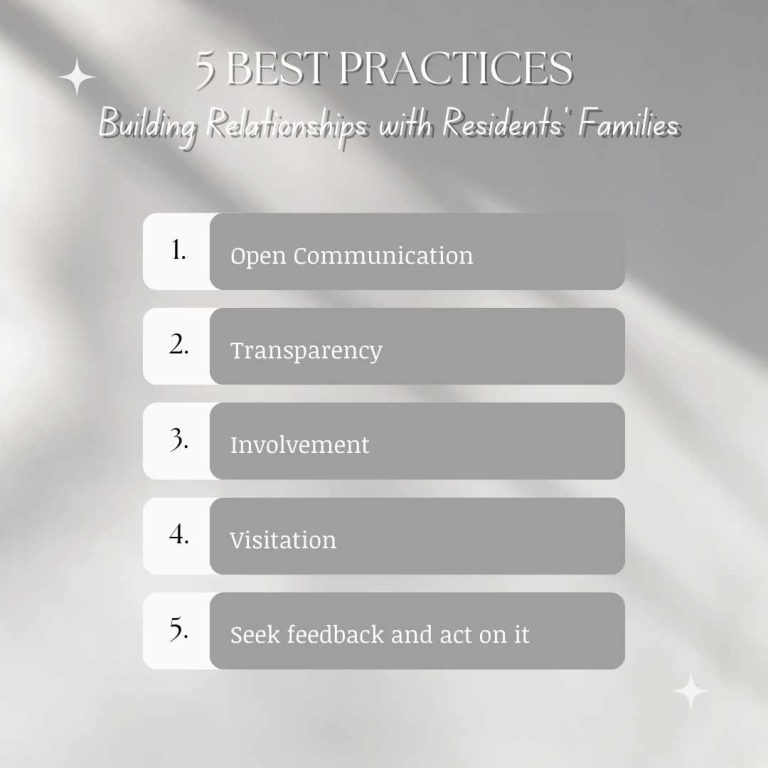@2021 invictIQ is a venture by Sprint Consultancy. All rights reserved. Privacy Policy.

Building Relationships with Residents' Families: Best Practices
by Mark Topps
Building relationships with residents’ families is critical and the pandemic shone a light on how not all care services were facilitating this effectively (or at all) and in April 2024 the Care Quality Commission released their guidance on visiting someone in a care home, and within this stated that visitation can help improve someone’s care but also allows relatives a chance to find out how their loved one is and see how well they are being looked after, ask the staff about their loved ones health and happiness, answer any questions the staff have for you and allow relatives to tell the staff about the individuals likes, dislikes or needs, so the service can arrange their care in a suitable way. In this blog, I am going to share my top five tips to help build relationships with relatives of those you are supporting.
Open Communication
The pandemic really highlighted to me the need for open and transparent communication but also that one communication channel may not work for everyone. Open communication I have found allowed me to build positive relationships with relatives, increased trust within the service, allowed me to be more responsive with updates and even saved me time in meetings with relatives as I was able to update them less formally. The channels of communication I used and would recommend are phone calls, emails, relative meetings, face to face meetings, newsletters, relative portal of the digital care planning system and text messaging.
If you are looking at improving the communication channels between your service and any relatives I would do the following things:
- Double check the person you are supporting is happy for you to share their information with their loved one. Remember, relatives do not have an automatic right to information.
- Ask the relatives which form of communication (out of the ones you use) that works for them. There is no point in using channels that they wont check or do engage with and you should focus your time and energies on those that they do.
- Provide information and resources about their loved one’s condition, treatment and available services. Often this is new to relatives, and being able to signpost them will save them time and efforts.
Transparency
I have touched on this above, but it is vital that you are honest and transparent with relatives to build trust and accountability. If you are not transparent, and a relative finds something out that you have not told them, you will lose their trust and it will be hard to regain this. Some ways I would improve transparency would be to:
- Provide regular updates – this could be on activities undertaken, health, setbacks, improvements etc. Ensure these are detailed and avoid using jargon that relatives may not understand.
- Utilise various communication channels
- Ensure staff are aware of the importance of open and transparent communication
- Ensure you speak to relatives when they come to visit their loved ones, even if it is to say hello and ask how they are. Showing your face and engaging will go along way.
- Ensure you address concerns promptly and openly, especially where there are lessons to be learnt.
- Where you have consent, allow family members to have access to medical records, care plans, risk assessments etc and involve them in reviewing and updating them.
Involvement
Involve family members as much as you can, especially when it comes to care plans and risk assessments. Of course, you need to remember to meet legal requirements and have consent to share information and you should always be able to challenge in the best interest of the person you are supporting but families know the life story, historic medical conditions and are often able to provide insights you would never gain without them.
Visitation
I touched at the beginning of this piece that the CQC have released guidance on visitation in care homes and you should encourage and facilitate regular visits and participation in resident activities. There will always be families that are unable to attend and think outside of the box of how to encourage them. Could you organise a family-friendly event such as a summer BBQ, fireworks evening etc that make it easy for families to spend quality time with their loved ones. One common thing I see that always welcomes relatives and families is through celebrating birthdays and special occasions together.
Seek feedback and act on it
Establish a system for families to provide feedback and voice concerns. If you follow my advice on open forms of communication, you will find this comes as part of this most of the time, but make sure you seek feedback in the form of surveys and suggestion boxes. Internally you should ensure you and your team have a clear process for how you will investigate and address any issues raised. “You Said, We Did” is a great way to demonstrate to relatives the actions you have taken off the back of their feedback.
Digital solutions like the Audit On Cloud platform by InvictIQ can be an excellent support. The Survey/Feedback module on this platform enables users to conduct surveys seamlessly while leveraging AI-powered sentiment analysis. This innovative feature not only facilitates the collection of feedback but also assists in understanding and categorising responses, allowing users to prioritise actions, especially in response to negative feedback. Additionally, automated reviews and key insights accompany each survey, enhancing the overall feedback management process.
There are many things you can do to build relationships with relatives, and these are just five tried and tested methods. Rights for Residents do an amazing job at supporting providers with their relative involvement initiatives and will always be happy to support. You can find out more here.
MORE ARTICLES


Mark Topps is a social care leader who has worked in the care industry since 2004 and is currently working as a regional support manager. He regularly advocates, appearing on television, radio and podcasts and has started many campaigns for change in legislation and culture within the industry. Mark is the co-founder of The Caring View which is a social care podcast, YouTube show and free resource initiative for the sector. He also co-founded The Health and Social Care Club, which is an audio event hosted on LinkedIn. Mark is also the social media and marketing director at the National Association of Care and Support Workers.
Share
Sign up for our newsletter
